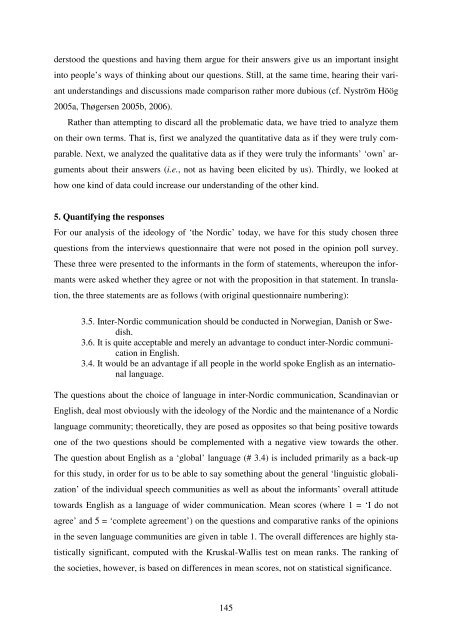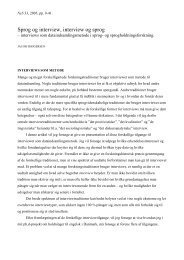Hør dog hvad de siger - Note-to-Self: Trials & Errors
Hør dog hvad de siger - Note-to-Self: Trials & Errors
Hør dog hvad de siger - Note-to-Self: Trials & Errors
Create successful ePaper yourself
Turn your PDF publications into a flip-book with our unique Google optimized e-Paper software.
<strong>de</strong>rs<strong>to</strong>od the questions and having them argue for their answers give us an important insight<br />
in<strong>to</strong> people’s ways of thinking about our questions. Still, at the same time, hearing their vari-<br />
ant un<strong>de</strong>rstandings and discussions ma<strong>de</strong> comparison rather more dubious (cf. Nyström Höög<br />
2005a, Thøgersen 2005b, 2006).<br />
Rather than attempting <strong>to</strong> discard all the problematic data, we have tried <strong>to</strong> analyze them<br />
on their own terms. That is, first we analyzed the quantitative data as if they were truly com-<br />
parable. Next, we analyzed the qualitative data as if they were truly the informants’ ‘own’ ar-<br />
guments about their answers (i.e., not as having been elicited by us). Thirdly, we looked at<br />
how one kind of data could increase our un<strong>de</strong>rstanding of the other kind.<br />
5. Quantifying the responses<br />
For our analysis of the i<strong>de</strong>ology of ‘the Nordic’ <strong>to</strong>day, we have for this study chosen three<br />
questions from the interviews questionnaire that were not posed in the opinion poll survey.<br />
These three were presented <strong>to</strong> the informants in the form of statements, whereupon the infor-<br />
mants were asked whether they agree or not with the proposition in that statement. In transla-<br />
tion, the three statements are as follows (with original questionnaire numbering):<br />
3.5. Inter-Nordic communication should be conducted in Norwegian, Danish or Swedish.<br />
3.6. It is quite acceptable and merely an advantage <strong>to</strong> conduct inter-Nordic communication<br />
in English.<br />
3.4. It would be an advantage if all people in the world spoke English as an international<br />
language.<br />
The questions about the choice of language in inter-Nordic communication, Scandinavian or<br />
English, <strong>de</strong>al most obviously with the i<strong>de</strong>ology of the Nordic and the maintenance of a Nordic<br />
language community; theoretically, they are posed as opposites so that being positive <strong>to</strong>wards<br />
one of the two questions should be complemented with a negative view <strong>to</strong>wards the other.<br />
The question about English as a ‘global’ language (# 3.4) is inclu<strong>de</strong>d primarily as a back-up<br />
for this study, in or<strong>de</strong>r for us <strong>to</strong> be able <strong>to</strong> say something about the general ‘linguistic globali-<br />
zation’ of the individual speech communities as well as about the informants’ overall attitu<strong>de</strong><br />
<strong>to</strong>wards English as a language of wi<strong>de</strong>r communication. Mean scores (where 1 = ‘I do not<br />
agree’ and 5 = ‘complete agreement’) on the questions and comparative ranks of the opinions<br />
in the seven language communities are given in table 1. The overall differences are highly sta-<br />
tistically significant, computed with the Kruskal-Wallis test on mean ranks. The ranking of<br />
the societies, however, is based on differences in mean scores, not on statistical significance.<br />
145



